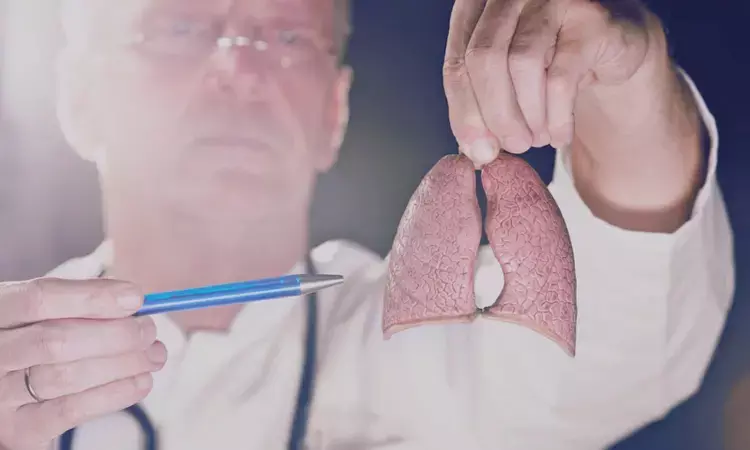- Home
- Medical news & Guidelines
- Anesthesiology
- Cardiology and CTVS
- Critical Care
- Dentistry
- Dermatology
- Diabetes and Endocrinology
- ENT
- Gastroenterology
- Medicine
- Nephrology
- Neurology
- Obstretics-Gynaecology
- Oncology
- Ophthalmology
- Orthopaedics
- Pediatrics-Neonatology
- Psychiatry
- Pulmonology
- Radiology
- Surgery
- Urology
- Laboratory Medicine
- Diet
- Nursing
- Paramedical
- Physiotherapy
- Health news
- Fact Check
- Bone Health Fact Check
- Brain Health Fact Check
- Cancer Related Fact Check
- Child Care Fact Check
- Dental and oral health fact check
- Diabetes and metabolic health fact check
- Diet and Nutrition Fact Check
- Eye and ENT Care Fact Check
- Fitness fact check
- Gut health fact check
- Heart health fact check
- Kidney health fact check
- Medical education fact check
- Men's health fact check
- Respiratory fact check
- Skin and hair care fact check
- Vaccine and Immunization fact check
- Women's health fact check
- AYUSH
- State News
- Andaman and Nicobar Islands
- Andhra Pradesh
- Arunachal Pradesh
- Assam
- Bihar
- Chandigarh
- Chattisgarh
- Dadra and Nagar Haveli
- Daman and Diu
- Delhi
- Goa
- Gujarat
- Haryana
- Himachal Pradesh
- Jammu & Kashmir
- Jharkhand
- Karnataka
- Kerala
- Ladakh
- Lakshadweep
- Madhya Pradesh
- Maharashtra
- Manipur
- Meghalaya
- Mizoram
- Nagaland
- Odisha
- Puducherry
- Punjab
- Rajasthan
- Sikkim
- Tamil Nadu
- Telangana
- Tripura
- Uttar Pradesh
- Uttrakhand
- West Bengal
- Medical Education
- Industry
Bisoprolol fails to improve outcomes in COPD patients at high risk of exacerbations: BICS trial

UK: In a landmark advancement in managing chronic obstructive pulmonary disease (COPD), the findings of the BICS (Bisoprolol in COPD Study) randomized clinical trial have brought attention to the role of bisoprolol in patients at high risk of exacerbation.
COPD, a progressive respiratory condition characterized by airflow limitation, poses significant challenges in treatment, particularly in preventing exacerbations that often lead to hospitalizations and a decline in quality of life.
The results of the BICS trial, published in the Journal of the American Medical Association (JAMA), showed that treatment with the β1-selective β-blocker bisoprolol did not reduce the number of self-reported COPD exacerbations requiring treatment with antibiotics, oral corticosteroids, or both among patients with COPD.
“These findings will help physicians and patients with COPD assess the risks and benefits of using bisoprolol to treat cardiovascular disease," the researchers wrote.
Chronic obstructive pulmonary disease is a leading cause of mortality and morbidity worldwide. Observational studies report that β-blocker use may be associated with lowered risk of COPD exacerbations. However, a recent trial reported that metoprolol did not reduce COPD exacerbations and increased COPD exacerbations requiring hospital admission. Graham Devereux, Liverpool School of Tropical Medicine, Liverpool, United Kingdom, and colleagues tested whether bisoprolol decreased COPD exacerbations in patients with a high risk of exacerbations.
For this purpose, the researchers conducted a double-blind, placebo-controlled RCT in 76 UK sites. It enrolled patients with COPD having at least moderate airflow obstruction on spirometry and at least 2 COPD exacerbations treated with oral corticosteroids, antibiotics, or both in the prior 12 months from 2018 to 2022. At least moderate airflow obstruction on spirometry was defined as the ratio of forced expiratory volume in the first second of expiration [FEV1] to forced vital capacity <0.7; FEV1 <80% predicted.
Patients were randomly assigned to bisoprolol (n = 261) or placebo (n = 258). Bisoprolol was started at 1.25 mg orally daily and was titrated as tolerated during four sessions to a maximum dose of 5 mg/d.
The primary clinical outcome was the number of patient-reported COPD exacerbations treated with antibiotics, oral corticosteroids, or both during the 1-year treatment period. Safety outcomes included adverse reactions and serious adverse events.
The following were the key findings of the study:
- Although the trial planned to enroll 1574 patients, recruitment was suspended due to the COVID-19 pandemic from March 16, 2020, to July 31, 2021. Two patients in each group were excluded postrandomization.
- Among the 515 patients (mean age, 68 years; 53% men; mean FEV1, 50.1%), primary outcome data were available for 99.8% of patients, and 72.0% continued taking the study drug.
- The primary outcome of patient-reported COPD exacerbations treated with oral corticosteroids, antibiotics, or both was 526 in the bisoprolol group, with a mean exacerbation rate of 2.03/y, vs 513 exacerbations in the placebo group, with a mean exacerbation rate of 2.01/y.
- The adjusted incidence rate ratio was 0.97.
- Serious adverse events occurred in 14.5% of patients in the bisoprolol group vs 14.3% in the placebo group (relative risk, 1.01).
The findings showed that treatment with bisoprolol did not reduce the number of self-reported COPD exacerbations requiring treatment with oral corticosteroids, antibiotics, or both among people with COPD at high risk of exacerbation.
Reference:
Devereux G, Cotton S, Nath M, et al. Bisoprolol in Patients With Chronic Obstructive Pulmonary Disease at High Risk of Exacerbation: The BICS Randomized Clinical Trial. JAMA. Published online May 19, 2024. doi:10.1001/jama.2024.8771
Dr Kamal Kant Kohli-MBBS, DTCD- a chest specialist with more than 30 years of practice and a flair for writing clinical articles, Dr Kamal Kant Kohli joined Medical Dialogues as a Chief Editor of Medical News. Besides writing articles, as an editor, he proofreads and verifies all the medical content published on Medical Dialogues including those coming from journals, studies,medical conferences,guidelines etc. Email: drkohli@medicaldialogues.in. Contact no. 011-43720751


